|
|
|
Sort Order |
|
|
|
Items / Page
|
|
|
|
|
|
|
| Srl | Item |
| 1 |
ID:
092552


|
|
|
|
|
| Publication |
2009.
|
| Summary/Abstract |
Based on the results of the 2008 presidential and congressional elections, an analysis using theories and methods of modern political science (pivotal politics theory, ideal point estimates, and bootstrap simulations) suggests that the conditions are ripe for real policy change. Specifically, we should expect policies to move significantly in a liberal direction, few or no policies should move in a conservative direction, and many of the outcomes will be moderate or somewhat to the left of center (rather than far left). Furthermore, the predictions depend as much on partisan polarization and the results of the congressional election as they do on the outcome of presidential election itself.
|
|
|
|
|
|
|
|
|
|
|
|
|
|
|
|
| 2 |
ID:
155950
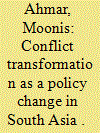

|
|
|
| 3 |
ID:
176124
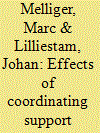

|
|
|
|
|
| Summary/Abstract |
The economic context for renewable power in Europe is shifting: feed-in tariffs are replaced by auctioned premiums as the main support schemes. As renewables approach competitiveness, political pressure mounts to phase out support, whereas some other actors perceive a need for continued fixed-price support. We investigate how the phase-out of support or the reintroduction of feed-in tariffs would affect investors’ choices for renewables through a conjoint analysis. In particular, we analyse the impact of coordination – the simultaneousness – of policy changes across countries and technologies. We find that investment choices are not strongly affected if policy changes are coordinated and returns unaffected. However, if policy changes are uncoordinated, investments shift to still supported – less mature and costlier – technologies or countries where support remains or is reintroduced. This shift is particularly strong for large investors and could potentially skew the European power mix towards an over-reliance on a single, less mature technology or specific generation region, resulting in a more expensive power system. If European countries want to change their renewable power support policies, and especially if they phase out support and expose renewables to market competition, it is important that they coordinate their actions.
|
|
|
|
|
|
|
|
|
|
|
|
|
|
|
|
| 4 |
ID:
117075
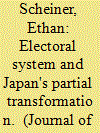

|
|
|
|
|
| Publication |
2012.
|
| Summary/Abstract |
Japan's electoral system, which emphasizes first-past-the-post, single-member district rules, has led the country's party system to become consolidated around the Liberal Democratic Party (LDP) and Democratic Party of Japan (DPJ). At the same time, Japan's electoral rules also made it likely that the two parties would not differ markedly in their policy positions, as well as hinder the emergence of new partisan alignments that could offer more clearly distinct policy options. Put differently, Japan's electoral rules have encouraged the development of what is essentially a two-party system, but one in which party alternation in power need not produce sharp policy change.
|
|
|
|
|
|
|
|
|
|
|
|
|
|
|
|
| 5 |
ID:
115664


|
|
|
|
|
| Publication |
2012.
|
| Summary/Abstract |
This paper looks at Energy Savings Obligations in the UK. More specifically, it discusses how the policy instrument changed over time and what the drivers of that change were. The UK was the first country in Europe that introduced obligations on suppliers to save energy at the customer end in 1994. Since then this policy changed rapidly and is now the principal instrument to deliver energy savings in the housing stock. The paper aims to answer three questions: First, how did the policy instrument change over time? Second, what were the key drivers of that change? Third, how did those pressures filter through the policy process and affect the energy savings obligations?
|
|
|
|
|
|
|
|
|
|
|
|
|
|
|
|
| 6 |
ID:
150013
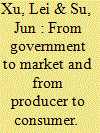

|
|
|
|
|
| Summary/Abstract |
This paper proposes a new typology that classifies innovation policy instruments into two dimensions: government-selection versus market-selection, and producer-orientation versus consumer-orientation. Such a typology articulates the importance of consumer behavior in the policy design for a transition, and the relevance for the market to select target subjects of policy during the deployment stage of clean technology innovation. We apply this typology to policy instruments of China's new energy vehicle (NEV) industry between 1991 and 2015 in order to explain the industry's rapid growth. The focus of China's policy mix has transited from government-selection to market-selection, and from producer-orientation to consumer-orientation. Other than the new typology, this paper traces the entire history of policy transition within China's NEV industry, and finds the transition to be a result of policy learning, thus contributing to future empirical studies of this industry.
|
|
|
|
|
|
|
|
|
|
|
|
|
|
|
|
| 7 |
ID:
153048


|
|
|
|
|
| Summary/Abstract |
The failed expedition of Suez in 1956 and France’s subsequent strategic ‘divorce’ from the United Kingdom and the United States lies at the heart of a policy paradigm that has dictated France’s defence posture from de Gaulle’s presidency to the end of the Cold War. Some crucial features of the Gaullist posture remain today enduring references for French presidents in the definition of France’s exceptionalism. While it is so, there have been significant changes since the 1990s when it comes to France’s strategic relations with the United States and the United Kingdom. This article demonstrates the extent and mechanisms of this rapprochement by analysing it through three dimensions of policy change: modes of action, institutional commitments and discourses. The article demonstrates the dimensions’ mutually reinforcing effects and argues that France’s exceptional posture has de facto been reversed.
|
|
|
|
|
|
|
|
|
|
|
|
|
|
|
|
| 8 |
ID:
095003


|
|
|
| 9 |
ID:
187499
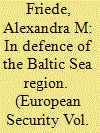

|
|
|
|
|
| Summary/Abstract |
This article analyses changes in national defence policies across the Baltic Sea region after the exogenous shock of the Ukraine crisis in 2014. It draws on Punctuated Equilibrium Theory for theoretical guidance, particularly to understand the mechanisms leading to large-scale policy change after periods of relative stability. Since the outbreak of the Ukraine crisis, defence budgets in the Baltic Sea region have increased dramatically. Baltic Sea states invested in neglected capability development and redirected policy planning towards territorial and collective defence. By contrast, the Russian-Georgian conflict in 2008 had a negligible effect on the paradigm guiding defence planning processes, delayed and lukewarm policy responses let adaptation pressure grow. The empirical findings suggest that policy change reinforced post-2014 because a normative consensus emerged on why Europe's security order is at risk, a critical threshold of urgency was reached, setting off positive feedback cycles, and receptive policy venues, such as NATO, as well as capable external policy actors, such as the USA and the UK, put Baltic Sea security back on the agenda.
|
|
|
|
|
|
|
|
|
|
|
|
|
|
|
|
| 10 |
ID:
125234
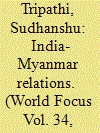

|
|
|
|
|
| Publication |
2013.
|
| Summary/Abstract |
India's Myanmar policy and its shift from an idealist position to one that is driven by pragmatism is a subject matter of much importance today as regards the success of India's rejuvenated 'Look East Policy'. Considering the reasons for the policy change, the article examines as to how far the policy is adequate for fulfilment of India's objectives in that country. But, above all, India has to maintain a cordial relationship with Myanmar's newly elected civilian government headed by President Thein Sein to extend its influence in Southeast Asia and also due to internal security concerns of its north-eastern states, which are under continuous threat from various insurgent groups.
|
|
|
|
|
|
|
|
|
|
|
|
|
|
|
|
| 11 |
ID:
092620
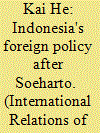

|
|
|
|
|
| Publication |
2008.
|
| Summary/Abstract |
Indonesian politics opened a new phase of democratization after Soeharto stepped down from his 32 years of authoritarian rule. In this paper, Indonesia's foreign policy changes after Soeharto are systematically examined through an 'international pressure-political legitimacy' model derived from neoclassical realism. This model specifies that Indonesia's foreign policy during democratization is mainly influenced by two factors: international pressure and the political legitimacy of the new democratic government. Four cases of foreign policy decision-making from three post-Soeharto presidencies are examined: (i) Indonesia's East Timor policy under Habibie; (ii) Indonesia's 'silence response' toward China's protest on the anti-Chinese riots under Habibie; (iii) Wahid's 'looking towards Asia' proposal; and (iv) Megawati's anti-terrorism and Aceh military operation. The results show that political legitimacy shapes the nature of state behavior, i.e. balancing or compromising, whereas international pressure determines the pattern of state behavior, i.e. external/internal balancing or compromising in words/in deeds
|
|
|
|
|
|
|
|
|
|
|
|
|
|
|
|
| 12 |
ID:
156097
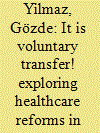

|
|
|
|
|
| Summary/Abstract |
The Turkish healthcare system has been transformed in the 2000s by adopting a comprehensive health model – the so-called Turkish Model. Although Europeanization dynamics were effective in Turkey in recent decades due to the acceleration of European Union (EU) accession process after 1999, healthcare reforms demonstrate a distinct process. This article analyzes the factors behind the health transformation through employing a policy transfer framework. It argues that a parallel process of health-policy transfer with Europeanization in other areas emerged in Turkey, and rather than the EU push, the Turkish healthcare model was a result of voluntary engagement for eliminating problems in this domain.
|
|
|
|
|
|
|
|
|
|
|
|
|
|
|
|
| 13 |
ID:
117073
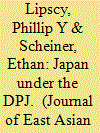

|
|
|
|
|
| Publication |
2012.
|
| Summary/Abstract |
In 2009, the Democratic Party of Japan (DPJ) brought an end to the long reign of the Liberal Democratic Party (LDP). However, despite high expectations, this politically transformative event has not unleashed significant policy change in Japan. We highlight five electoral factors that have acted as important constraints on policy change under DPJ rule. First, majoritarian electoral rules have led to a convergence in the policy positions of the two major political parties. Second, as the parties' policy positions have become more similar, voters have increasingly cast ballots based on "valence" (i.e., nonpolicy) evaluations. Third, large national vote swings have limited the tenure of young, inexperienced candidates who might otherwise serve as the instigators of reform. Fourth, Japan's electoral rules permit inconsistency across policy positions within parties and discourage greater policy coherence. Fifth, the continuing influence of rural regions has limited the scope of policy reform under the DPJ.
|
|
|
|
|
|
|
|
|
|
|
|
|
|
|
|
| 14 |
ID:
167462
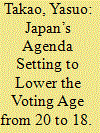

|
|
|
|
|
| Summary/Abstract |
What age a state designates as appropriate for voting rights raises a range of democratic and empirical issues. The lowering of the voting age in Japan in 2015 was the biggest expansion of the country’s democratic franchise since 1945, yet it happened in an abrupt manner. Lowering the voting age was not a significant issue among the Japanese public until the mid-2000s and the government began supporting the move officially only in 2014. Why then? What happened to precipitate this decision? This study argues that the circumstances governing the period before the policy decision was made are crucial to understanding what followed. In the prevailing theories of policy change, analysis has focused much more on the phase of decision making over policy; public opinion, policy beliefs, and policy transfer have been prominently cited as the major reasons for lowering the voting age in other countries. In contrast, this article claims that the policy opportunity spillover, from constitutional revision to voting age, was a necessary condition for lowering the age. The discussion of constitutional revision incidentally opened a policy window to another issue area, in this case voting age. The findings help us answer the question of what time period we need to examine in order to discern actual policy dynamics.
|
|
|
|
|
|
|
|
|
|
|
|
|
|
|
|
| 15 |
ID:
189897


|
|
|
|
|
| Summary/Abstract |
Why is the implementation of civil war peace agreements comparatively higher in some countries than in other countries? In this study, I address this puzzle by investigating the effects of insider-outsider leader turnover on the execution of peace agreements. The idea is that leaders should be the fundamental units of analysis to explain the implementation of peace agreements due to more frequent leadership changes than state-level variables, such as the level of democracy, political system, military capability, and GDP per capita. Besides, leader turnover poses a commitment problem in peace processes if outsider leaders differ in their resolve and revise inherited agreements. I test this hypothesis quantitatively using feasible generalized least squares (FGLS) regressions to analyze the panel dataset of this research that covers 34 comprehensive peace agreements of 31 countries from 1989 to 2015. The findings of this study demonstrate the positive impacts of insider leader turnover and the adverse effects of outsider leader turnover on the execution of peace agreements. Hence, whether the implementation of peace agreements will continue depends on who comes to power.
|
|
|
|
|
|
|
|
|
|
|
|
|
|
|
|
| 16 |
ID:
167071


|
|
|
|
|
| Summary/Abstract |
Policy entrepreneurs play a pivotal role in policy changes in both electoral democracies and authoritarian systems. By investigating the case of healthcare reform in Sanming City, this article illustrates how the fragmented bureaucracy in China enables and constrains local policy entrepreneurs, and how entrepreneurial manoeuvring succeeds in realigning the old institutional structures while attacking the vested interests. Both structural conditions and individual attributes are of critical importance to the success of policy entrepreneurship. Four factors and their dynamic interactions are central to local policy entrepreneurship: behavioural traits, political capital, network position and institutional framework. This study furthers theoretical discussion on policy entrepreneurship by elucidating the fluidity of interactional patterns between agent and structure in authoritarian China. The malleability of rigid institutions can be considerably increased by the active manoeuvring of entrepreneurial agents.
|
|
|
|
|
|
|
|
|
|
|
|
|
|
|
|
| 17 |
ID:
105739


|
|
|
|
|
| Publication |
2011.
|
| Summary/Abstract |
Saskatchewan, a Canadian prairie province, has recently begun to restructure the provincial energy system. The institutional, technological and social bases of the Saskatchewan power regime have been disrupted by both exogenous pressures and endogenous problems, providing an opportunity for alternative energy options to be considered as possible power alternatives. As the province addresses the long-term socio-technical transition (STR) associated with a regime change in the power sector a number of alternative energy options have been identified. Using a transition management approach, this paper argues that the path taken will depend very much on whether these alternatives can be adopted as modifications of the existing STR - leaving the key actors, institutions and relationships essentially untouched - or whether they will necessitate a wholesale reconstruction of the regime itself. In this paper we analyze how, over time, the socio-technical configurations of the energy system became very durable as existing technologies become embedded in regulatory frameworks, infrastructure, users practices and expert communities. We then consider the potential of several alternative technological trajectories and the likelihood of one of these socio technical regimes emerging in Saskatchewan.
|
|
|
|
|
|
|
|
|
|
|
|
|
|
|
|
| 18 |
ID:
186857


|
|
|
|
|
| Summary/Abstract |
Providing high-level policy advice to developing countries with the purpose to shape national policies is a key function of the UN. Yet no official UN definition of policy advice exists and little is known on how much weight the UN gives to this support modality in contrast to capacity-building and implementation work. To address this gap, this article first articulates the case for the UN’s role in policy change. It then presents an empirical analysis of the policy advice landscape of the UN, providing a numerical estimate of the share of resources dedicated to policy advice and identifying five practical constraints on the UN’s policy advice function. Results suggest that, despite high expectations, the UN’s fieldwork is not strategically focused on policy advice. This article contributes to the underresearched field of UN development work and how it is, or should be, shaped by the UN’s multilateralism.
|
|
|
|
|
|
|
|
|
|
|
|
|
|
|
|
| 19 |
ID:
159498
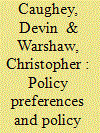

|
|
|
|
|
| Summary/Abstract |
Using eight decades of data, we examine the magnitude, mechanisms, and moderators of dynamic responsiveness in the American states. We show that on both economic and (especially) social issues, the liberalism of state publics predicts future change in state policy liberalism. Dynamic responsiveness is gradual, however; large policy shifts are the result of the cumulation of incremental responsiveness over many years. Partisan control of government appears to mediate only a fraction of responsiveness, suggesting that, contrary to conventional wisdom, responsiveness occurs in large part through the adaptation of incumbent officials. Dynamic responsiveness has increased over time but does not seem to be influenced by institutions such as direct democracy or campaign finance regulations. We conclude that our findings, though in some respects normatively ambiguous, on the whole paint a reassuring portrait of statehouse democracy.
|
|
|
|
|
|
|
|
|
|
|
|
|
|
|
|
| 20 |
ID:
076783
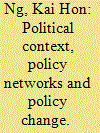

|
|
|
|
|
| Publication |
2007.
|
| Summary/Abstract |
Central to the debates on the transition of Hong Kong to Chinese sovereignty is how this process has affected change in the policy process and policy outputs. Many see policy change as a result of the evolving political environment in Hong Kong following the political transition. This article, however, adopts the notion of policy networks and argues that the analysis of policy change cannot be reduced to a simple contextual stimulus - the policy alteration model. A case study - 'the development of civic education' - demonstrates the importance of policy networks, as a particular structure of government and group relations in decision making, in explaining the course of policy change. It is apparent that the relationship between regime change and political liberalization, on the one hand, and established networks, on the other, tends to be complex and dialectical in Hong Kong. Despite the importance of sovereignty transition and political restructuring, the effect of contextual factors on public policy greatly depends on the nature of the network involved
|
|
|
|
|
|
|
|
|
|
|
|
|
|
|
|
|
|
|
|
|